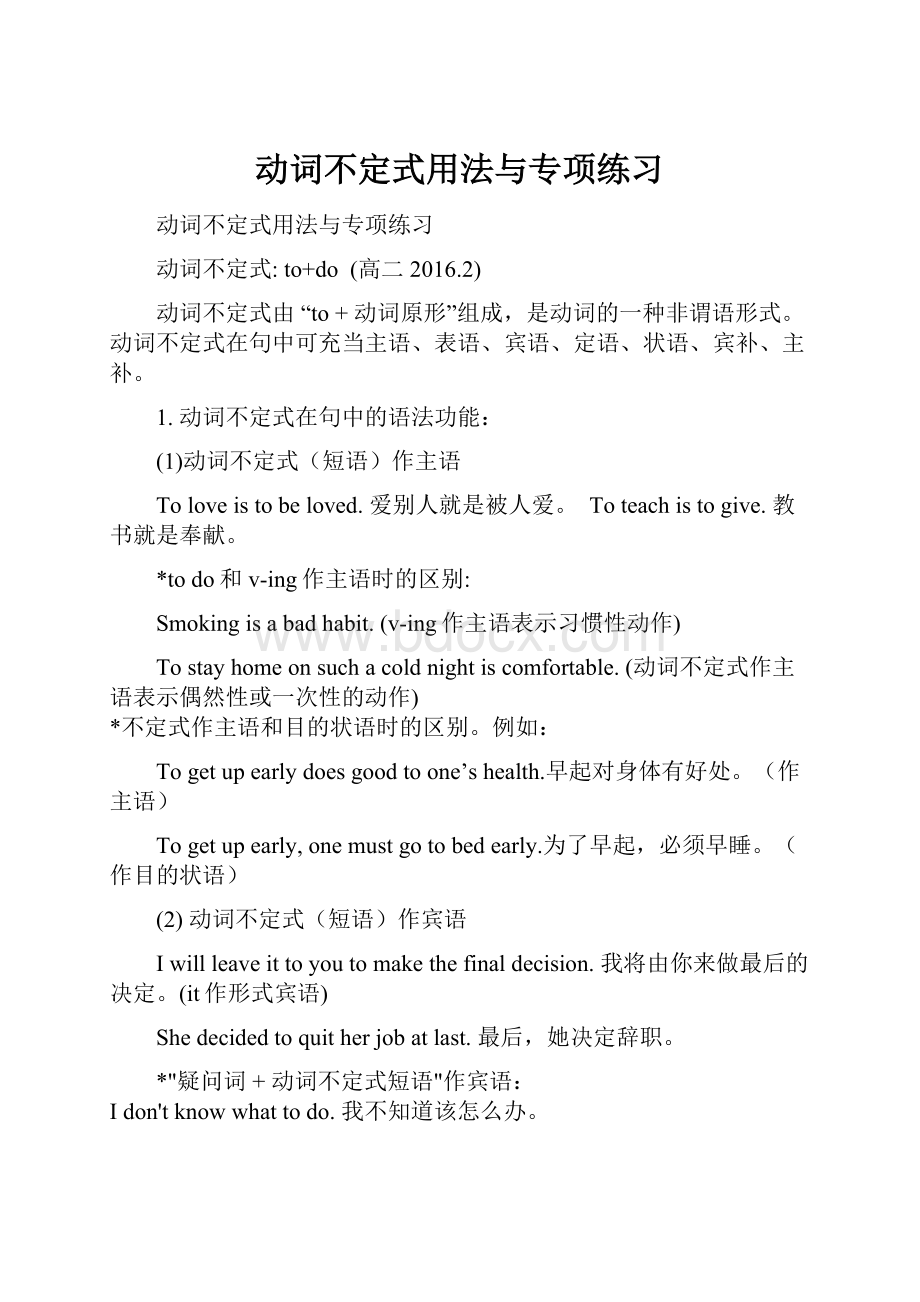动词不定式用法与专项练习.docx
《动词不定式用法与专项练习.docx》由会员分享,可在线阅读,更多相关《动词不定式用法与专项练习.docx(14页珍藏版)》请在冰豆网上搜索。

动词不定式用法与专项练习
动词不定式用法与专项练习
动词不定式:
to+do(高二2016.2)
动词不定式由“to+动词原形”组成,是动词的一种非谓语形式。
动词不定式在句中可充当主语、表语、宾语、定语、状语、宾补、主补。
1.动词不定式在句中的语法功能:
(1)动词不定式(短语)作主语
Toloveistobeloved.爱别人就是被人爱。
Toteachistogive.教书就是奉献。
*todo和v-ing作主语时的区别:
Smokingisabadhabit.(v-ing作主语表示习惯性动作)
Tostayhomeonsuchacoldnightiscomfortable.(动词不定式作主语表示偶然性或一次性的动作)
*不定式作主语和目的状语时的区别。
例如:
Togetupearlydoesgoodtoone’shealth.早起对身体有好处。
(作主语)
Togetupearly,onemustgotobedearly.为了早起,必须早睡。
(作目的状语)
(2)动词不定式(短语)作宾语
Iwillleaveittoyoutomakethefinaldecision.我将由你来做最后的决定。
(it作形式宾语)
Shedecidedtoquitherjobatlast.最后,她决定辞职。
*"疑问词+动词不定式短语"作宾语:
Idon'tknowwhattodo.我不知道该怎么办。
Thechildrenarelearninghowtoplaythegame.孩子们在学做游戏。
例如(NMET2000):
I’veworkedwithchildrenbefore,soIknowwhat____inmynewjob.
A.expectedB.toexpectC.tobeexpectingD.expects(答案:
B)
(whattoexpect在句中作know的宾语,而what作不定式toexpect的逻辑宾语。
)
(四川09)Hetolduswhether_______apicnicwasstillunderdiscussion.
A.tohaveB.havingC.haveD.had(答案:
A)
又如:
ItissaidthatinAustraliathereismorelandthanthegovernmentknows____.
A.itwhattodowithB.whattodoitwith
C.whattodowithitD.todowhatwithit
答案是C。
whattodowithit作knows的宾语。
*注意:
有些动词后面必须跟动名词作宾语,平时要注意区别,进行区分。
*forget,remember,try,regret,mean,stop等动词后既可跟不定式又可跟动名词,须根据其习惯用法和语境进行取舍。
例如(MET91):
—Thelightintheofficeisstillon.—Oh,Iforgot____.
A.turningitoffB.turnitoffC.toturnitoffD.havingturneditoff
答案是C。
forgettodo意为“忘了做(某事)”,forgetdoing“忘了做过(某事)”;remember有类似的区别。
类似的还有:
trytodo“尽力做”,trydoing“试着做”;regrettosay/tell“很遗憾地说”,regretdoing“后悔做了……”;meantodo“意欲/想要做”,meandoing“意味着做”;stoptodo“停下来做另外的事情”,stopdoing“停止正在做的事情”。
Themeetingbeingheldisimportant.(表示动作正在进行当中)
Themeetingtobeheldisimportant.(表示动作将要发生)
注意:
1)当被修饰的是不定代词如everything,anything,much,little等,或被修饰的名词前被形容词最高级,序数词,theonly等强调结构修饰时,非谓语动词作定语则用动词不定式。
Doyouhaveanythingtosay?
你有什么要说的吗?
IamafraidIcannotattendyourparty,forIhavetoomanythingstodo.
Heistheonlypersontoknowthetruth.他是唯一了解真相的人。
Whenthequestionwasout,hewasthefirstonetoraisehishand….他第一个举起手。
Hewasthelasttorealizetheimportanceofthisproblem.
2)如被修饰的名词或代词是动词不定式的逻辑宾语,且动词不定式的动词是不及物动词,则后面需跟成为搭配的介词。
Whoisthemantotalkto?
要谈话的人是谁?
Heisatoughteachertodealwith.他是个很难对付的老师。
Ineedapentowritewith.我需要一支笔写字
例如:
Tofetchwaterbeforebreakfastseemedtomearule_____.(上海高考题98):
A.toneverbreakB.nevertobebrokenC.nevertohavebrokenD.nevertobebreaking
答案是B,在句中作定语;由于arule是不定式的逻辑宾语,所以不定式用了被动结构。
又如:
Therearefivepairs____,butI’matalosswhichtobuy.(上海高考题99)
A.tobechosenB.tochoosefromC.tochooseD.forchoosing
答案是B,这是“不定式+介词”作定语。
题意是“从五双中选一双”,故须在choose后加上介词from。
类似的如achairtositin,apentowritewith,atopictotalkabout等。
(6)动词不定式(短语)作状语
动词不定式(短语)作状语可以表示目的,结果,原因等。
▲目的状语
Thewholefamilycameouttoseemyperformance.全家人出来看我表演。
Hecalledtosaygoodbye.他打电话来道别。
▲结果状语
Werushedtotherailwaystationonlytofind(表示出乎意料)thetrainhadjustleft.
我们匆匆赶到火车站,结果发现火车刚刚离开了。
Hestudiedhardonlytofail.他学习很努力,但却没及格。
ShewenttoSouthChinafiveyearsago,nevertoreturn.她五年前去了华南,结果从未返回。
*注意:
doing也可以作结果状语,但表示自然而然的结果。
Hisparentswerekilledintheaccident,makinghimanorphan.
Theyallleft,leavingmealone.
▲原因状语
动词不定式(短语)常跟在一些形容词后面,说明产生这些情绪的原因。
这类形容词有:
happy,ashamed,surprised,grieved,frightened,sorry,glad,delighted,eager,disappointed,right,excited,ready,clever,bored等。
Iamsorrytointerruptyou.
Thefatherwassurprisedtolearnthathissonspentmoneylikewater.
得知儿子花钱如流水,父亲感到很吃惊。
Wewillbeveryhappytoworkonthisprojectwithyou.
和您一起合作这个项目,我们感到很高兴。
(7)动词不定式(短语)作独立成分
动词不定式(短语)可以用来作句子的独立成分。
这些短语有:
tobeginwith(首先),totellthetruth(truthtotell)(说实在的),tomakealongstoryshort(长话短说),sotospeak(可以这么说),tobebrief(简言之),tobeexact(确切地说),tobefrank(坦率地说),todosb.justice(说句公道话),toconclude(总而言之)等。
Tobeginwith,I'dliketointroducemyselftoyouall.首先,我想给你们作一下自我介绍。
Tobefrankwithyou,Idon'tloveyouanymore.老实对你说吧,我已经不再爱你了。
Toconclude,energyisexhaustible,sowehavetopreserveitforourfuturegenerations.
总而言之,能量并不是用之不竭的,因此我们必须为后代保留一些。
2.动词不定式中原形动词的省略
为避免重复,有时可用不定式的符号to来代表动词不定式。
-Wouldyouliketohavesomecoffee?
您要来点咖啡吗?
-Yes,I'dliketo.
Ifyoudon'twanttobuyit,youdon'tneedto.假如你不想买的话,你就不要买。
注意:
可以这样省略主要动词的动词不定式结构有:
hopeto,agreeto,bewillingto,wantto,refuseto,failto,manageto,wouldliketo,offerto等。
---What’sthematterwithDella?
---Well,herparentswouldn’tallowhertogototheparty,butshestill______.(江苏09)
A.hopestoB.hopessoC.hopesnotD.hopesfor(答案:
A)
一般而言,在否定结构中to必须保留。
例如(NMET95):
Theboywantedtoridehisbicycleinthestreet,buthismothertoldhim_____.
A.nottoB.nottodoC.notdoitD.donotto(答案:
A)
3.动词不定式的否定式:
not必须置于整个不定式结构之前。
Wedecidednottogothere.我们决定不去那儿了。
Iwishednevertoseehimagain.我希望永不再见到她。
4.动词不定式的时态和语态
时态
▲动词不定式的一般式:
todo:
表示的动作与谓语动词的动作是同时发生或将在其后发生的。
Theyarelearningtosinganddance.他们在学习歌舞。
WehavetogetsomemoneytobuyaTVset.我们得赚些钱来买台电视机。
▲动词不定式的进行式:
tobedoing:
表示的动作是与谓语动词的动作同时发生的,而且正在进行中。
该结构也常与always,constantly,rapidly,fast,slowly等副词连用。
Theweatherseemstobeimproving.天气似乎在好转。
Comeon,it'stimetobemakingfor(前往,走向)school.好了,是上学的时候了。
Hepretendedtobereadingwhentheteachercamein.
▲动词不定式的完成式:
tohavedone:
表示的动作发生在谓语的动作之前。
不定式的完成式常用在besaid,bereported,beconsidered,appear,hope,pretend,seem等以及某些情态动词后,表示对过去事情的推断或虚拟假设,例如(NMET97):
Iwouldlove____tothepartylastnightbutIhadtoworkextrahourstofinishareport.
A.togoB.tohavegoneC.goingD.havinggone
答案是B,表示与过去事实相反的虚拟愿望。
Hewassaidtohavestudiedabroadforyears.据说他已经在外国留学多年了。
Iamsorrytohavekeptyouwaiting.很抱歉让你久等了。
Hepretendednottohaveseenmewhenpassingbyyesterday.
他昨天从我身边经过时假装没看到我。
语态
▲不定式的被动式:
tobedone
如:
Heaskedtobesenttothefront.(他请求被派往前线。
)
Iwishtobeexcused.我请求原谅。
Thisinfectiousdiseaseissaidtohavebeenwipedoutmanyyearsago.这传染病据说好多年前就已经灭绝了。
Havingatripabroadiscertainlygoodfortheoldcouple,butitremains____whethertheywillenjoyit.
A.toseeB.tobeseenC.seeingD.seen
答案是B。
因为不定式的逻辑主语it(指出国旅游这件事)与不定式是被动关系。
LittleTomwouldlove____tothetheatrethisevening.(NMET’92)
A.tobetakenB.totakeC.beingtakenD.taking(答案A)
It’simportantforthefigures_______regularly.(北京2011)
A.tobeupdatedB.tohavebeenupdatedC.toupdateD.tohaveupdated(答案:
A)
Heclaimed(声称)____inthesupermarketwhenhewasdoingshoppingyesterday.
A.beingbadlytreatedB.treatingbadlyC.tobetreatedbadlyD.tohavebeenbadlytreated
根据题意,该用不定式的完成被动式,表动作发生在claimed之前,故答案是D。
***值得注意的是,在下列场合通常用不定式的主动式表被动意义:
▲主语+be+形容词+动词不定式
当作表语的某些形容词被动词不定式修饰时,动词不定式与句子主语之间存在着逻辑上的动宾关系,动词不定式可以用主动式代替被动式。
(阅P1)
Thisproblemisdifficulttosolve.这个问题很难解决。
▲there+be句型中,动词不定式用主动式来表示被动的含义。
Therearealotofpeople(forme)tovisit.Thereisnotimetolose.没有时间可以耽误。
▲“have+宾语+动词不定式(作定语)”结构中
当have表示"有",而动词不定式与宾语之间存在着逻辑上的动宾关系,并且句子的主语是动词不定式动作的执行者时,动词不定式一般用主动式。
Ihavealotofmeetingstoattendthisweek.本周我有许多会议要参加。
▲在“too…to”,“…enoughto”结构中,动词不定式总是用主动语态。
Thisproblemistooeasytodealwith.这个问题处理起来很简单。
Thisproblemiseasyenoughtodealwith.这个问题处理起来很简单。
巩固练习
1.Heissaidto____tohiscountrybecauseanewpresidentcomesintopower.
A.beallowedtoreturnB.allowtoreturnC.allowreturningD.beallowedreturning
2.Hespokeinsuchahighvoice____atthefurtherendoftheroom.
A.astobeheardB.tobeheardC.astohearD.tohear
3.---Whywastheofficialmeetingcalled?
---____newofficers.
A.SelectB.SelectingC.ToselectD.Tohaveselect
4.Thepurposeofnewtechnologiesistomakelifeeasier,___itmoredifficult.
A.notmakeB.nottomakeC.notmakingD.don’tmake
5.Toplayfairisasimportantas____.
A.toplaywellB.playwellC.weplaywellD.playingwell
6.---WhereshouldIsendmyform?
---ThePersonnelOfficeistheplace_______.
A.forsendingitB.tosendittoC.tosentD.tosentit
7.Acomputerdoesonlywhatthinkingpeople_____.
A.haveitdoB.haveitdoneC.havedoneitD.havingitdone
8.Theboywanttoridehisbicycleinthestreet,buthismothertoldhim____.
A.nottoB.nottodoC.notdoitD.donotto
9.---Doyouworkinthelabeveryafternoon?
---No,butsometimes,IwishI____.
A.hadtimetoB.hadtimetodoC.havetimetoD.havetime
10.I’lldowhateverIcan____myEnglish.
A.improveB.toimproveC.improvingD.toimproving
11.Couldyoutellmethewayyou’vethoughtof___?
A.todoitB.doingitC.doitD.hastodoit
12.Hewasoftenlistened____inthenextroom.
A.singB.sungC.tosingD.tosinging
13.Wouldyoube____shutthewindow?
It’ssocold.
A.enoughkindtoB.kindenoughnottoC.kindenoughtoD.sokindenoughasto
14.Don’ttakethemedicine,itcan’thelp__ridofyourcold.
A.gettingB.togetC.togettingD.gets
15.Mygrandmotherseemstohavealot__.
A.worryaboutB.toworryC.tobeworriedD.toworryabout
16.Everyminutesismadefull___of___ourlessons.
A.touse,studyB.use,studyingC.useful,tostudyD.use,tostudy
17.Iwouldlove____tothepartylastnightbutIhadtoworkextrahourstofinishareport.
A.togoB.tohavegoneC.goingD.havinggone
18.Youshouldn’tallow____gamesneartheclassroom,forit’stoonoisy.
A.studentplayingB.playC.studentstoplayD.toplay
19.Thewaiterwasmade__totheguest.
A.apologizeB.apologizingC.toapologizeD.tobeapol